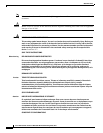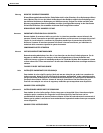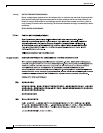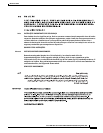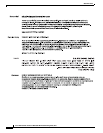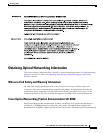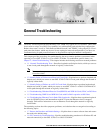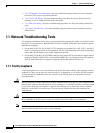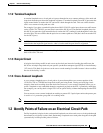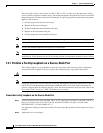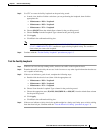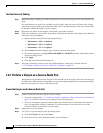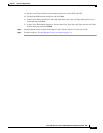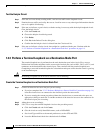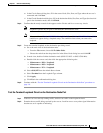
1-2
Cisco ONS 15310-CL and Cisco ONS 15310-MA Troubleshooting Guide, R7.0
Chapter 1 General Troubleshooting
1.1 Network Troubleshooting Tests
• 1.9 CTC Operation Troubleshooting—Provides troubleshooting procedures for Cisco Transport
Controller (CTC) login or operation problems.
• 1.10 Circuits and Timing—Provides troubleshooting procedures for circuit creation and error
reporting as well as timing reference errors and alarms.
• 1.11 Fiber and Cabling—Provides troubleshooting procedures for fiber and cabling connectivity
errors.
• 1.12 Power and LED Tests—Provides troubleshooting procedures for power problems and lists
LED behavior.
1.1 Network Troubleshooting Tests
Use loopbacks and hairpins to test newly created circuits before running live traffic or to logically locate
the source of a network failure. Both the ONS 15310-CL and ONS 15310-MA allow electrical, optical,
and Ethernet loopbacks:
• For the ONS 15310-CL, the 15310-CL-CTX controller card contains DS-1, DS-3, EC-1, and OC-3
or OC-12 optical ports which can be loopbacked. The CE-100T-8 Ethernet cards can be loopbacked,
but the ML-100T-8 Ethernet card cannot support this function.
• For the ONS 15310-MA, the CTX2500 controller card contains OC-N ports that can support optical
loopbacks. The DS1-28/DS3-EC1-3 card and DS1-84/DS3-EC1-3 card support electrical loopbacks.
The CE-100T-8 Ethernet card supports loopbacks, but the ML-100T-8 card does not.
1.1.1 Facility Loopback
A facility loopback tests a card’s line interface unit (LIU) and related cabling. After applying a facility
loopback on a port, use an optical or electrical test set, as appropriate, to run traffic over the loopback.
A successful facility loopback isolates the card LIU or the cabling plant as the potential cause of a
network problem.
Caution Before performing a facility loopback on any port, make sure there are at least two data communications
channel (DCC) paths to the node where the card is installed. A second DCC provides a nonlooped path
to log into the node after the loopback is applied, thus enabling you to remove the facility loopback.
Ensuring a second DCC is not necessary if you are directly connected to the node containing the
loopback port.
Caution A facility loopback applies to an entire facility and not to an individual circuit. Exercise caution when
using loopbacks on an OC-N port carrying live traffic because this traffic can be interrupted.
Note In CTC, the facility loopback is sometimes called a “facility (line)” loopback to indicate the direction
that the loopback signal travels, that is, toward the span.



